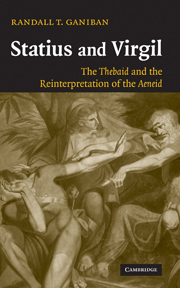Book contents
- Frontmatter
- Contents
- Preface
- List of abbreviations
- 1 Introduction
- 2 Oedipus' curse
- 3 Horror, prophecy, and the gods
- 4 Hypsipyle's narrative of nefas
- 5 Bacchus and the outbreak of war
- 6 Dis and the domination of hell
- 7 Delay and the rout of Pietas
- 8 Spectacle, crime, and monarchy at Thebes
- 9 Pietas, burial, and clementia in a world of nefas
- Works cited
- General index
- Index locorum
3 - Horror, prophecy, and the gods
Published online by Cambridge University Press: 22 September 2009
- Frontmatter
- Contents
- Preface
- List of abbreviations
- 1 Introduction
- 2 Oedipus' curse
- 3 Horror, prophecy, and the gods
- 4 Hypsipyle's narrative of nefas
- 5 Bacchus and the outbreak of war
- 6 Dis and the domination of hell
- 7 Delay and the rout of Pietas
- 8 Spectacle, crime, and monarchy at Thebes
- 9 Pietas, burial, and clementia in a world of nefas
- Works cited
- General index
- Index locorum
Summary
In chapter 2, we saw that Oedipus programmatically announces nefas as the major goal of the epic. But his prayer represents only one way that the Thebaid creates expectations of the poem's criminal content. In this chapter, I will show how the reader's prior experience of the literary tradition also heightens the anticipation of the crimes Statius' poem recounts, while it also underscores, by contrast, the ignorance of characters concerning the criminal nature of the Theban war. An ironic disjunction consequently arises between the reader's understanding of the fraternal war and that of characters (both human and divine) who promote or endure the war but seemingly lack the moral insight given to the reader.
I begin with the prologue of the epic to show the extent to which the poem advertises its criminal content (both through previews and through reference to the literary tradition) and reveals the creation of horror as a major effect of the epic. I will then focus on the divine and prophetic events in books 1–4 that precede the start of the Argive expedition against Thebes to demonstrate how the criminality of the brothers' conflict, always known to the reader, is continually suppressed or ignored by characters. I will argue that the resulting disjunction creates for the reader a sense of horror, one of the essential pleasures of the Thebaid.
- Type
- Chapter
- Information
- Statius and VirgilThe Thebaid and the Reinterpretation of the Aeneid, pp. 44 - 70Publisher: Cambridge University PressPrint publication year: 2007



